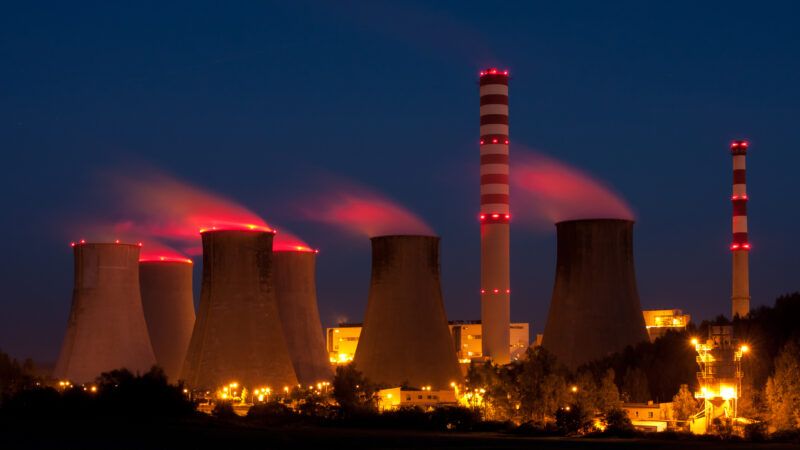Energy Abundance Is Liberating Humanity From Grueling Labor
Robert Zubrin’s The Case for Nukes highlights the connection between energy and freedom.

Refreshingly pragmatic and nonpartisan, The Case for Nukes: How We Can Beat Global Warming and Create a Free, Open, and Magnificent Future (Polaris Books, 2023) by Robert Zubrin offers a sweeping history of energy technology advances. It also provides a taxonomy of the enemies of nuclear power, including Malthusians and "degrowth" advocates who would, ironically, limit the world's only scalable clean energy technology in the name of protecting the environment. The book launches a compelling and detailed defense of one of humanity's most promising yet misunderstood sources of energy. Policy makers across the political spectrum would be wise to heed Zubrin's call to reform and liberalize what he calls the "regulatory whipsawing and strangulation of the nuclear industry."
Zubrin pulls no punches, refusing to play games of political tribalism (i.e., opining that climate change "has become politicized to the point where opposing parties have chosen to either deny it or grossly exaggerate it"). While he presents nuclear energy's potential to lower emissions as a huge positive, he also notes, "The existential threat facing humanity is not climate change. It is the ideologies of despair."
Specifically, when people see the world as a zero-sum battle over scarce energy and limited resources, such desperation can curtail freedoms and even produce unthinkable atrocities. As Zubrin writes, "If the belief persists that there is only so much to go around, then the haves and the want-to-haves are going to have to duke it out, the only question being when." He frames producing ample energy as not only an economic but also a moral imperative.
Although the book's main point may be to promote nuclear power as a solution to some of society's problems, Zubrin's most gripping insight lies not in the specifics of its case for nuclear energy but in its broader dual thesis about the relationship between energy abundance (regardless of the energy's source) and freedom. He writes that energy technology "is the foundation for freedom." He posits both that free societies are better able to produce energy and that access to more energy liberates mankind.
Zubrin tells of how, as civilization has become increasingly energy-intensive, our employment of energy has liberated humanity—particularly women—from grinding labor. "Powered mills had the same significance for women of the Twelfth Century as washing machines did for those of the Twentieth," Zubrin claims. He quotes the ancient Greek poet Antipater of Thessalonica, who praised the water wheel's reduction of women's work hours with these words:
Hold back your hand from the mills, you grinding girls. Even if the cockcrow heralds the dawn, sleep on. For Demeter [the goddess of harvest and agriculture] has imposed the labors of your hands on the [water] nymphs, who leaping down upon the topmost part of the wheel, rotate its axle; with encircling cogs, it turns the hollow weight of the Nisyrian millstones. If we learn to feast toil-free on the fruits of the earth, we taste again the golden age.
The water wheel saving women from waking at sunrise for the mind-numbing task of grinding grain to make bread is just one more example of how technological advances throughout history have arguably benefited women even more than men.
Harnessing energy and mechanizing labor has unshackled countless individuals from exhausting toil—a liberating process that is ongoing in many countries as more households gain access to electricity and labor-saving devices such as laundry machines. Given how many tasks now delegated to electric machines traditionally fell to women, perhaps it is unsurprising that many prominent advocates of an energy-abundant future fueled by nuclear power are women, or as Zubrin alliteratively puts it, a "fine friendly force of fierce feminine fission freedom fighters."
Of course, as Zubrin would likely agree, energy access alone does not create freedom, even if it may help to counter the scarcity mindset that is so often freedom's enemy. One need only look to the Gulf petrostates featuring both massive oil fields and authoritarian political systems to find proof that energy abundance is insufficient to spread liberalism or gender equality.
Oil-rich Saudi Arabia did not even issue driver's licenses to its female citizens until five years ago. It is clear that freedom leads to energy abundance. It is more doubtful that energy abundance necessarily leads to freedom broadly understood—although it at least defuses scarcity-based rationales for limiting human liberty. (Sadly, authoritarians have invented many other justifications for restricting freedom.)
While energy abundance and freedom may be somewhat mutually reinforcing, if humanity were to pick only one, the choice seems clear: institutions and policies of freedom. History shows that free people in lands devoid of natural resources can innovate their way to high living standards. (As Zubrin points out, "It is human ingenuity that turns natural raw materials into resources.")
Consider Hong Kong's whirlwind free market transformation from a barren island into a gleaming metropolis in the 1950s and the 1960s. Freedom is the wellspring of prosperity and innovation, and the energy needed to power modernity. As Zubrin notes, when it comes to environmental challenges, once again, "Freedom is not the problem. Freedom is the solution. Prosperity is not the problem. Prosperity is the solution."
Zubrin also writes that "human progress must and will inevitably entail continued exponential growth of human power generation." Whether humanity generates that power with nuclear reactors or finds an even better solution, the relationship between many aspects of freedom and energy is worth pondering.
Zubrin's book shows the urgency of unleashing energy abundance. He argues convincingly that a future of bountiful energy could help preserve the liberty that scarcity often imperils. Embracing freedom is the surest way to power the future.


Show Comments (283)